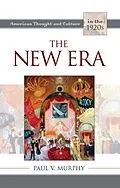In the 1920s, Americans talked of their times as "modern," which is to say, fundamentally different, in pace and texture, from what went before-a new era. With the end of World War I, an array of dizzying inventions and trends pushed American society from the Victorian era into modernity.
The New Era provides a history of American thought and culture in the 1920s through the eyes of American intellectuals determined to move beyond an older role as gatekeepers of cultural respectability and become tribunes of openness, experimentation, and tolerance instead. Recognizing the gap between themselves and the mainstream public, younger critics alternated between expressions of disgust at American conformity and optimistic pronouncements of cultural reconstruction. The book tracks the emergence of a new generation of intellectuals who made culture the essential terrain of social and political action and who framed a new set of arguments and debates-over women's roles, sex, mass culture, the national character, ethnic identity, race, democracy, religion, and values-that would define American public life for fifty years.
Autorentext
Paul V. Murphy is associate professor of history at Grand Valley State University.
Zusammenfassung
In the 1920s, Americans talked of their times as modern, which is to say, fundamentally different, in pace and texture, from what went beforea new era. With the end of World War I, an array of dizzying inventions and trends pushed American society from the Victorian era into modernity.
The New Era provides a history of American thought and culture in the 1920s through the eyes of American intellectuals determined to move beyond an older role as gatekeepers of cultural respectability and become tribunes of openness, experimentation, and tolerance instead. Recognizing the gap between themselves and the mainstream public, younger critics alternated between expressions of disgust at American conformity and optimistic pronouncements of cultural reconstruction. The book tracks the emergence of a new generation of intellectuals who made culture the essential terrain of social and political action and who framed a new set of arguments and debatesover women's roles, sex, mass culture, the national character, ethnic identity, race, democracy, religion, and valuesthat would define American public life for fifty years.
Inhalt
Foreword by Howard Brick and Lewis Perry, Series Editors
Acknowledgments
Introduction: The New Era
Chapter 1: The Gay Table
Chapter 2: Navigating Mass Society
Chapter 3: The Bridge
Chapter 4: Mulatto America
Chapter 5: The Eclipsed Public
Chapter 6: The Inner Check
Chronology
Notes
Bibliographical Essay
Index
